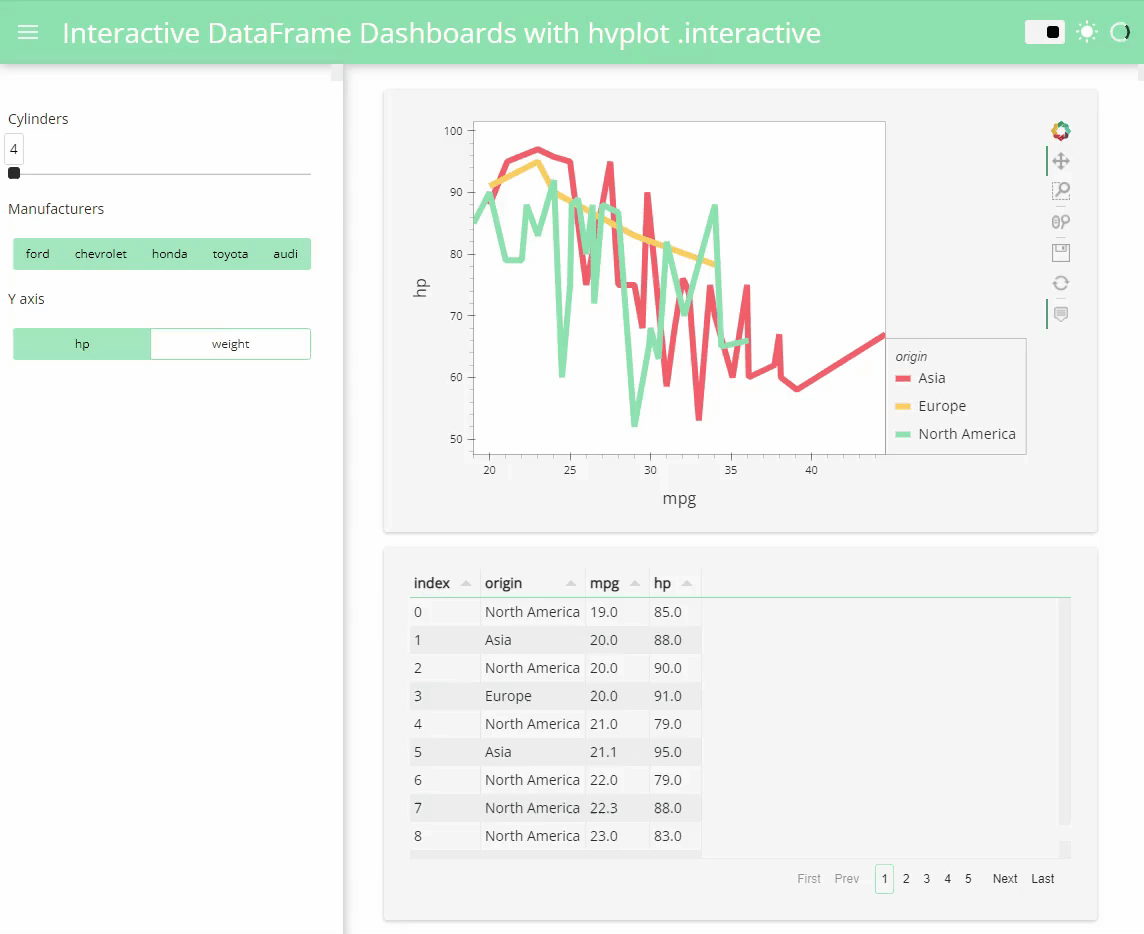A high-level plotting API for the PyData ecosystem built on HoloViews.
Project description
hvPlot makes data analysis and visualization simple 
| Build Status |  |
| Coverage |  |
| Latest dev release |   |
| Latest release |      |
| Python |  |
| Docs |   |
| Binder |  |
| Support |  |
Home | Installation instructions | Getting Started Guide | Reference Guides | Examples | License | Support
hvPlot provides a familiar, high-level API for visualization
The API is based on the familiar 🐼 Pandas .plot API and the innovative .interactive API.

hvPlot works with the tools you know and ❤️
hvPlot
- supports a wide range of data sources including Pandas, XArray, Dask, Streamz, Intake, GeoPandas and NetworkX.
- supports the plotting backends Bokeh, Matplotlib and Plotly.
- exposes the powerful tools from the HoloViz ecosystem in a familiar and convenient API.
hvPlot is the recommended entrypoint to the HoloViz ecosystem.
hvPlot can be used for exploration, reporting and data apps
Check out this blog post to see how easy it is to create an interactive dashboard with hvPlot and Panel.
Installation Instructions
hvPlot supports Python 3.6, 3.7, 3.8, 3.9 and 3.10 on Linux, Windows, or Mac and can be installed with conda:
conda install -c pyviz hvplot
or with pip:
pip install hvplot
You can download the guides and example notebooks as a .zip file by clicking this
link.
Please note that for versions of jupyterlab<3.0, you must install the JupyterLab extension manually with:
jupyter labextension install @pyviz/jupyterlab_pyviz
How to use hvPlot in 3 simple steps
Work with the data source you already know and ❤️
import pandas as pd, numpy as np
idx = pd.date_range('1/1/2000', periods=1000)
df = pd.DataFrame(np.random.randn(1000, 4), index=idx, columns=list('ABCD')).cumsum()
Import the hvplot extension for your data source and optionally set the plotting backend
import hvplot.pandas
# Optional: hvplot.extension('matplotlib') or hvplot.extension('plotly')
Use the .hvplot API as you would use the Pandas .plot API.
df.hvplot()
To get started check out the user guide or the live user guide on Binder.
How to make your data pipeline .interactive
Just add .interactive and replace your normal arguments with Ipywidgets or Panel widgets.
import panel as pn
pn.extension()
df.interactive(width=600).head(n=pn.widgets.IntSlider(start=1, end=5, value=3))
To get started check out the .interactive guide or the live .interactive guide on Binder.
How to find documentation from your notebook or editor
To see the available arguments for a specific kind of plot run
hvplot.help(kind='scatter')
In a notebook or ipython environment the usual
helpand?will provide you with documentation.TABandSHIFT+TABcompletion will help you navigate.
Examples
Download | Run on Binder | View Gallery
License
hvPlot is completely free and open-source. It is licensed under the BSD 3-Clause License.
Support & Feedback
| Type | Channel |
|---|---|
| 🐛 Bug Reports |  |
| 🎁 Feature Requests |  |
| 👩 Usage Questions |  |
| 👩💻 Developer Questions |  |
| 📢 Announcements |  |
Contributions
We would ❤️ to work with you no matter whether you want to contribute to issue management, PRs, documentation, blog posts, community support or social media communication.
To get started with the code or docs check out the Developer Guide.
Reach out on Gitter to discuss with the developers, join the weekly triaging or join the bi-weekly HoloViz call.
Project details
Release history Release notifications | RSS feed
Download files
Download the file for your platform. If you're not sure which to choose, learn more about installing packages.
Source Distribution
Built Distribution
Hashes for hvplot-0.8.2a1-py2.py3-none-any.whl
| Algorithm | Hash digest | |
|---|---|---|
| SHA256 | dbdf096cc9c4949fe94d47963b0dec93073efb2e33e72a08e228131b15dec795 |
|
| MD5 | e3721bae586d3d40b5e3646d66d36eb8 |
|
| BLAKE2b-256 | 55661f59d3b5bd843f952c2777c335cfdd42ffec0a8d4c45799971383f2996e5 |

















